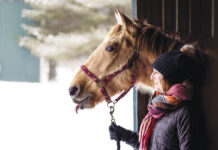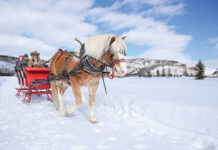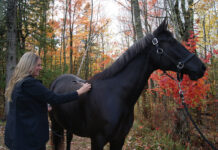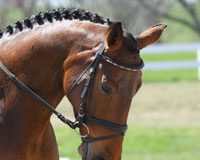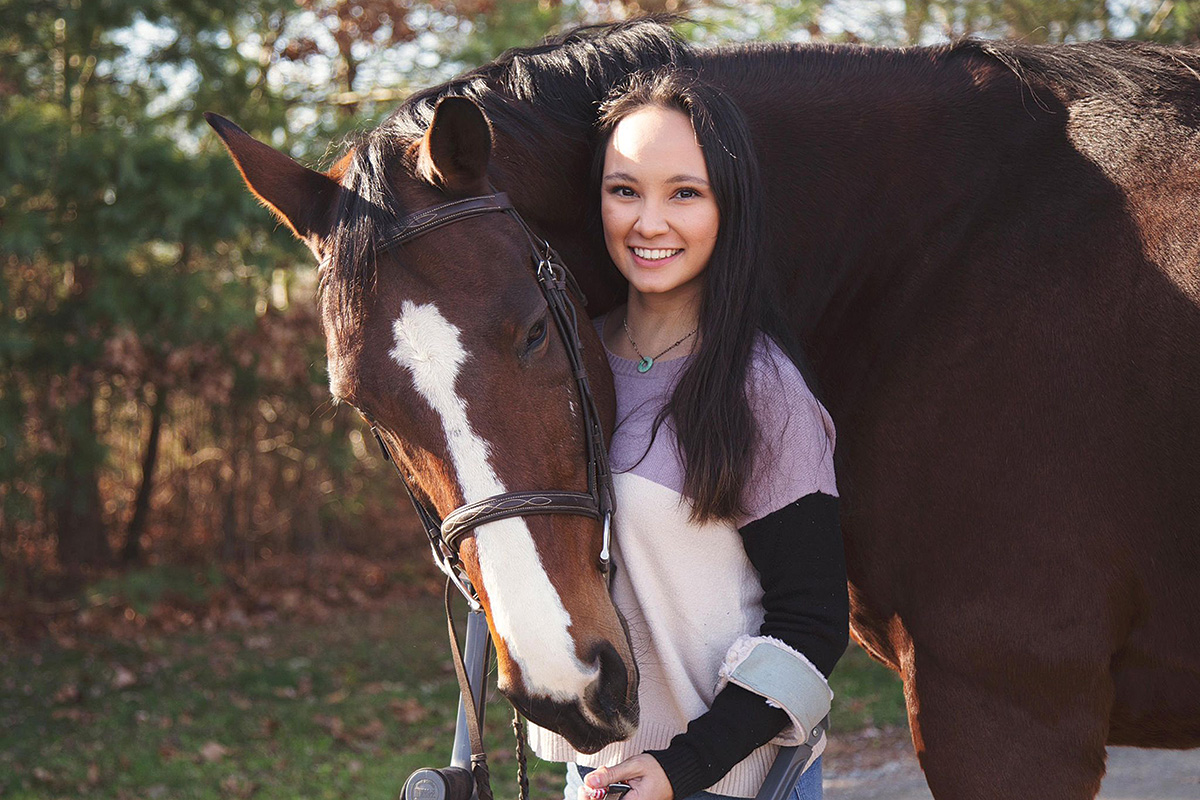
When award-winning para equestrian Lauren Reischer was born 24 years ago, the Centers for Disease Control and Prevention (CDC) estimated that 1 in every 550 children born in the United States was diagnosed with cerebral palsy (CP). The most common motor disability in childhood, CP constitutes a group of disorders that affect the ability to move and maintain balance and posture. Of four chief types, spastic CP affects roughly 80 percent of those diagnosed. Spastic CP manifests as muscle stiffness and tightening, primarily in the legs and hips, along an entire side of the body, or at its most severe, throughout the limbs, trunk and face.
She describes her legs as so tightly twisted together that they were like “a mermaid’s tail.” But this is no children’s fable. This is the true story of a mermaid who captained her Brown University equestrian team (and saved its varsity status), a grand champion at Long Island’s prestigious Hampton Classic, a therapeutic riding advocate, and a biracial para equestrian who refused to be a statistic at the hands of her disability.
Better Call Sol
“I’m just 10 percent—Lauren is the other 90,” says her dad, Sol Reischer, about his role in the life of the girl that he and Mary Kong brought into the world. “When Lauren was diagnosed as a baby, our doctors hypothesized that not only would her life be challenging, but that her condition would worsen with age.
“We had an excellent nanny and car service for her doctors’ appointments,” he says. “I hated it.”
He quit working on the American Stock Exchange to invest in his daughter’s weekly occupational, speech and physical therapy appointments.
At 2 years old, Sol says Lauren’s muscles were becoming so taut that they were pulling her femurs out of their hip sockets. She underwent extensive hip surgery that included cutting her femurs and removing the sockets before pinning everything back in place.
From there, she faced three months at Rusk Rehabilitation (ranked by U.S. News & World Report as one of the top 10 rehabilitation programs in the country) in a V-shaped body cast, equipped with a bar that manually forced her legs apart to help retrain her brain to “see” her legs as two separate limbs.
“They were seeing results,” Lauren says. She was using a walker, but her rehab team, led by Joan T. Gold, M.D., a specialist in cerebral palsy and pediatric rehabilitation at Rusk, wanted more. “They recommended therapeutic riding, where the motion of having my legs apart, of having my body move with a horse, would train my legs to work.”
The Help of a Horse
For tiny Lauren, a New York City-based therapeutic riding program known as GallopNYC had just the horse for the job: a one-ton Clydesdale called Voltan.
“Because my legs still didn’t separate on their own above the knee, my dad pulled the handlers [two off-duty New York City mounted police officers] aside and said, ‘Listen, we may have to put her on her knees and hold her there.’ They told him, ‘Relax. We’ve got this. Just wait and see.’
“When they picked me up, my legs separated on their own for their first time ever,” Lauren says. “I don’t know if it was because I made the connection that this is what was supposed to happen, but it worked. I sat on that horse. Upright. With my legs separated.”
Voltan’s cautious steps helped Lauren take her own. “Those movements became my muscle memory,” she says.
Sol agrees. “As scary as it was for a concerned parent, it proved to be the best, most fruitful and most therapeutic experience we ever encountered,” he says. “It’s how my daughter and I became involved with GallopNYC. The rewards she reaped from participation in GallopNYC were miraculous.”
In fact, Sol is now its board chairman, and Lauren has trained nearly a dozen therapy horses, while also supporting new riders with the program. GallopNYC is the first and only equestrian center in New York City offering weekly lessons focused on the therapeutic needs of veterans, adults, senior citizens and children.
“Lauren is always looking to pass on what she’s picked up in her 20 years to help others,” Sol says. “Ninety-nine percent of what people thought her parents were doing is what she was doing for us. She makes us better, not the other way around.”
Captain of Her Fate
“I’m not squeamish, but while in rehabilitation, Lauren saw daily what no one should ever see, like a child who was there because he had been set on fire by his own dad,” Sol says. “It made her more empathetic to others—to be helpful rather than complain about her problems.”
Horses continued to help Lauren find her stride. A GallopNYC instructor, Ben Goldberg, told Sol that if he were willing to drive Lauren to his barn in Goshen, N.Y., he’d train her “like any other able-bodied rider.”
“That’s all she ever wanted,” says Sol.
As a teenager at the Dalton School, Lauren embraced its high school motto, “go forth unafraid.” She was earning respect—and ribbons—in flat and jumping classes at shows, including the Hampton Classic.
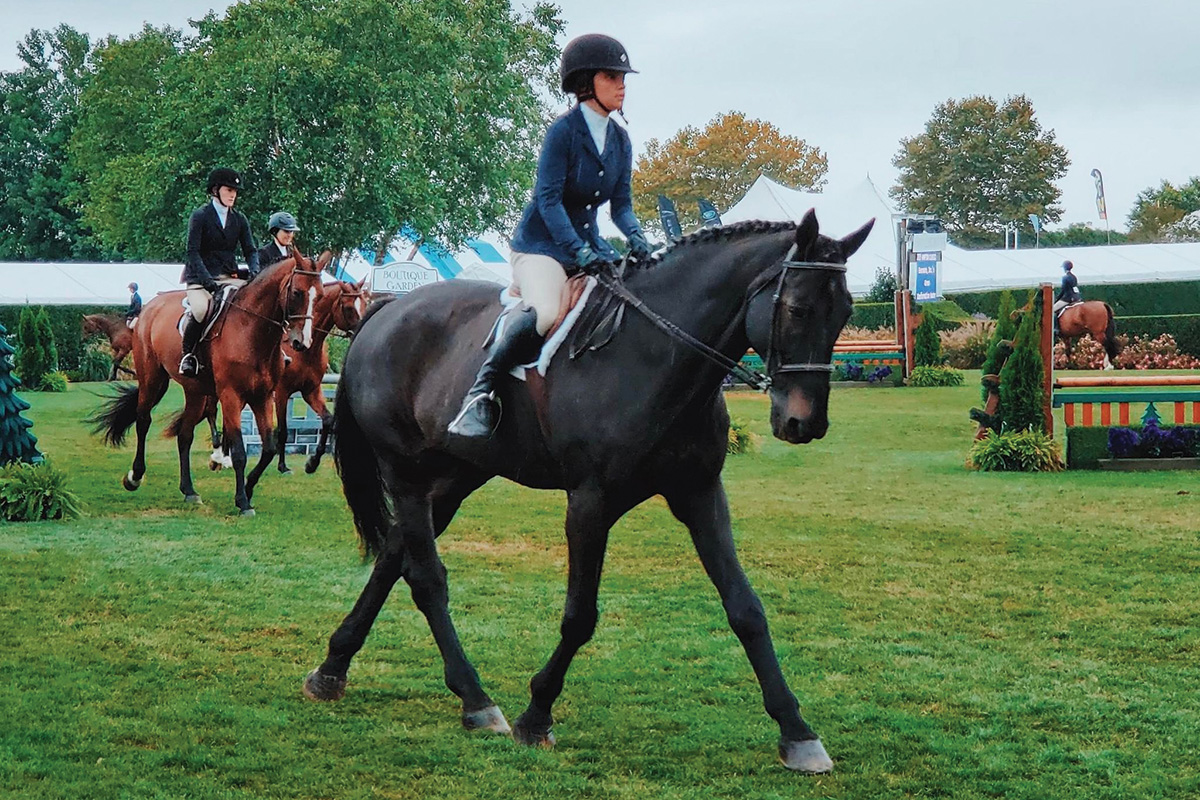
It was there in 2016 that Lauren rode a chestnut pony named Opportunity Knocks to first place in all their classes. The equestrian was named grand champion in the independent division of the Long Island Horse Shows Series for Riders with Disabilities (LIHSSRD) Finals.
“If it weren’t for my mom’s severe allergies, she’d be around horses more,” Lauren grins. “But that has had its upside, too. If something isn’t going right, like the time I needed a catch [ride] three days out from a show, she is on it! And before I could do it myself, she handled my entries, et cetera. She can work any horse show website.”
Also read- Equestrian Vaulting as Therapy
College-Bound
The year after winning her Hampton Classic title, it was time to choose a college and—naturally—a riding program. The decision boiled down to which institution would work with her CP best. Ivy League perks like a personal four-wheel drive golf cart were nice, but not compared to NCAA requirements that equestrian athletes engage in physical training multiple times a week.
Only Brown University offered Lauren her own physical therapist to ensure she could comply with staying fit for collegiate competition.
At the same time Lauren was training at Brown, she was riding and boarding a horse of her own at Tom Andreozzi and Dawn Dorrance’s facility. When he first saw her crutches, Andreozzi confesses he was skeptical.
“I was like, ‘Really? How is this going to happen?” But two years into working with her, he no longer equated being handicapped with being sensitive or delicate.
“How [someone’s] body functions might be different from mine, but it doesn’t mean they can’t achieve their goals,” he says. “If you don’t have the heart to do this sport, it doesn’t matter how physical you are in terms of what you can and can’t do. Lauren has heart. Even though her body isn’t a hundred percent, her heart makes up for it.”
A Serious Blow
The size of that heart was tested when, in her senior year, Lauren was named a co-captain of Brown’s hunt seat team. Then, at the start of the pandemic, the university announced it was including equestrian among 11 sports it was reclassifying from varsity to club status.
Sitting in on the webinar announcement, she heard the cut explained not as a budget issue, but because the team wasn’t perceived as “excellent enough” to keep its varsity status.
“This had to be a joke,” Lauren recalls. “Not excellent enough? Brown finished top three in 11 out of the last 20 years and earned more trips to the national championships than any other Ivy League team. If they cut the team, they were [also] cutting 100 percent of its disabled athletes: Me.”
Lauren is the first and only graduate of GallopNYC in the nearly 20-year history of the organization to compete at the NCAA level.
“Brown was the only school I applied to that had an NCAA equestrian team,” she says. “Instead of diminishing me to a box labeled by the things I can’t do, Brown chose to pay attention to the things that I can do.
“It meant the world to me that Brown had provided the opportunity to ride at an NCAA level. Very few people with disabilities get to call themselves athletes, and even fewer get to call themselves Division I athletes.”
Fighting for Her Passion
She went straight to Brown’s director of athletics, Jack Hayes, to advocate for her team and sport. They kept meeting all summer, culminating in a conference call with two of the most powerful and persuasive voices in the horse industry: Bob Cacchione, founder of the Intercollegiate Horse Shows Association, and Tom O’Mara, U.S. Equestrian Federation president.
Much like her “tiger mom,” Lauren wasn’t taking no for an answer.
“I was not intimidated by his position. I told him to let me work with him on a path to reinstatement,” she says. “We built a good relationship. He took my phone calls.”
She asked him if the president of the National Football League would have made time to be on a conference call the way these two sports leaders had.
“That awakened him to how important riding is and how much inclusivity it offers,” Lauren says. “Everyone plays. No one sits on the bench or wastes athletic department money. Less than three months later [in September 2020], we were reinstated.
“We all have things that disable us in life,” concludes the former little mermaid, who has since accepted a position as associate director of development with Special Olympics, the leading organization for competitive athletes with intellectual disabilities and their communities.
Lauren competed in the 2022 Land Rover Kentucky Three-Day Event, participating in the para dressage and para jumping demonstrations.
This article about Lauren Reischer, an equestrian who overcame her disability, appeared in the May 2022 issue of Horse Illustrated magazine. Click here to subscribe!

